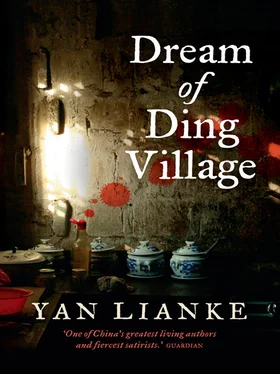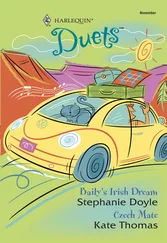Fear and uncertainty brought more people flooding into the school. Soon, nearly every villager with the fever was living in the elementary school. My uncle Ding Liang was one of the last to arrive.
The day his wife dropped him off at the school gate, it was snowing. The couple stood awkwardly, shuffling their feet in the snow. ‘You’d better go,’ my uncle said at last. ‘There are too many sick people here. If I haven’t infected you, someone else might.’
But my aunt continued to stand there, snowflakes falling on her hair.
‘You go on home,’ Uncle told her. ‘Don’t worry about me. I’ll be okay. My dad’s here.’
Obediently, my aunt turned and began to walk away. Uncle watched her disappear into the snowstorm. She was quite far away when he shouted, ‘Don’t forget to visit! Come and see me every day!’ My aunt nodded her head, confirming that she’d heard him, but still Uncle made no move to enter the schoolyard. He stood at the gate, gazing after his wife. It was the gaze of a lover, the gaze of a man who feared he might never see his wife again. Uncle loved his wife. He loved her as he loved this life.
Uncle had been experiencing the symptoms of the fever for some time, but the initial discomfort had passed. Although he hadn’t the strength to lift a pail of water, he had regained his appetite and could eat a whole steamed bun and half a bowl of soup at one sitting. Several months earlier, when the disease had first taken hold, he’d assumed it was a common cold or fever. After a brief respite during which he had seemed to recover, his skin had begun to itch. One morning Uncle woke to find his face, crotch and trunk covered in nasty-looking sores. The itching was intolerable, so bad that it made him want to bash his head against a wall. He began suffering from unexplained sore throats, bouts of nausea and an inability to eat, even when he knew he was hungry. He seemed to vomit up twice as much food as he managed to swallow. By then, Uncle realized what was happening: he had the fever. Worried about infecting his wife Tingting or his son, my cousin Little Jun, Uncle decided to move out of his bedroom and into a separate room of the house.
‘Someday soon, I’ll be dead,’ he told my aunt. ‘Once I’m gone, I want you to take Jun and leave Ding Village. Get married to someone living far away, as far away as possible from this awful place.’
Yet his conversation with my dad was a different story. ‘Brother,’ he said, ‘Tingting and Jun went into the city for tests and they came up negative. When I’m dead, you’ve got to make sure they don’t leave the village. If Tingting ever remarried, I’d roll over in my grave. My soul would never rest in peace.’
Yes, Uncle loved his wife, almost as much as he loved his life.
One day, thinking about his illness, and the fact that he would soon die, the tears began to fall. ‘Why are you crying?’ my aunt asked.
‘It’s not dying I’m afraid of,’ Uncle sniffled. ‘I just hate the thought of leaving you alone. Promise me that when I’m gone, you’ll get remarried and take our son away from this village.’
His conversation with my grandpa was a different tune. ‘Dad,’ he said, ‘you know Tingting listens to you, and you know she trusts you. Since no one in this world will ever love her as much as me, and no one will ever treat her better, you’ve got to convince her to stay in the village and never get remarried.’
But Grandpa wasn’t ready to make this promise. ‘If you stay alive, son,’ Grandpa reasoned, ‘she’ll have no cause to get remarried. There’s an exception to every rule, right? Folks get diagnosed with terminal cancer all the time, but some of them survive for ten more years.’
Hoping that he might prove an exception to the rule, Uncle went on with his life, taking second helpings at meals and drinking double shots of sorghum whisky for dessert. As a twenty-nine-year old man in his prime with an attractive twenty-eight-year old wife, his biggest worry now was his sex life. His wife refused to let him touch her, or even hold her hand. What was the point of defying the odds, of going on living, if your life had no meaning? He wished he had someone to talk to, but when it came to sex, he had no idea how to broach the subject.
Oh yes, Uncle loved his wife. He loved her, but he also loved his life.
It was unfortunate that after leaving her husband standing at the school gate, my aunt forgot to turn back and look at him. Uncle kept watching, waiting for her to turn around, but she never did. He bit his lip so hard it bled, but he wasn’t going to cry.
Still biting his lip, Uncle kicked at a pebble on the ground.
The little village school grew crowded. Nowadays, the people roaming the halls were not elementary school students but grown men and women, mostly between the ages of thirty and forty-five. Following Grandpa’s instructions, the sexes were segregated: men’s dorms in the classrooms on the second floor, and women’s dorms on the first floor. Some brought proper beds from home, while others slept on doors or wooden planks. The less-fortunate simply pushed a few desks together and slept on top of them. The tap in the schoolyard was constantly running, and there was always a line of people waiting in front of it. Near the tap, there were two small storage rooms piled with broken desks, chairs and classroom equipment. One had been converted into a kitchen for the residents. As soon as one person had cleared a space near the door and set up a stove, another installed a wooden board for kneading dough beneath the windowsill, and so on, until the little room was so cluttered you could hardly put a foot down.
The clean white snow in the schoolyard was trampled into mud.
Spaces beneath stairwells overflowed with jars, crockery, and sacks of rice and grain.
Grandpa bustled around the school, giving instructions to the residents and overseeing what got moved and where. He made sure that the classrooms were cleared of essential items. Blackboards, chalk, textbooks and homework notebooks left behind by students were collected and locked safely in a storage room.
Though students had stopped coming to class, the school remained in use. There were people who needed it. Grandpa, his brow moist with youthful perspiration, busied himself looking after everyone’s needs. Having something to do made him feel younger and more energetic. Even his hunched back seemed straighter. Although his hair was still white, it looked shinier and healthier, not as grizzled as before.
In a second-grade classroom, residents pushed desks against the wall and arranged chairs in the centre of the room to form a meeting hall. One of the residents, a man who couldn’t cook very well, made a suggestion: ‘As most of us are sick and are going to die soon, why should we have to cook for ourselves? Wouldn’t it make more sense to eat our meals together?’
After some quick calculations, the residents agreed that cooking separately was a waste of time and money. By eating together, they could save on firewood and conserve their food stores. The most critical matter now was the promised government food subsidy. The higher-ups had promised to provide high-quality rice and enriched flour to everyone with the fever who agreed to be quarantined in the school. The reasoning was that this way, sick villagers wouldn’t have to cook for themselves, and they could also save money on food and rent.
Grandpa called everyone to a meeting in the converted classroom. This seemed appropriate because he was, after all, a teacher. Well, a sort-of teacher. Many of the residents were illiterate, unable to read or write more than a few characters, but those who were able to read had been taught by Grandpa in his days as a substitute teacher. They were, in a sense, his students. Now they were grown men and women, but they were living in the school, a place where Grandpa had always been in charge of things. All of them were sick, and some might die any day now. Grandpa was the only one at the school who didn’t have the fever, and he wasn’t afraid of catching it. It was only natural that they would look to him as a leader. Well, a sort-of leader.
Читать дальше












